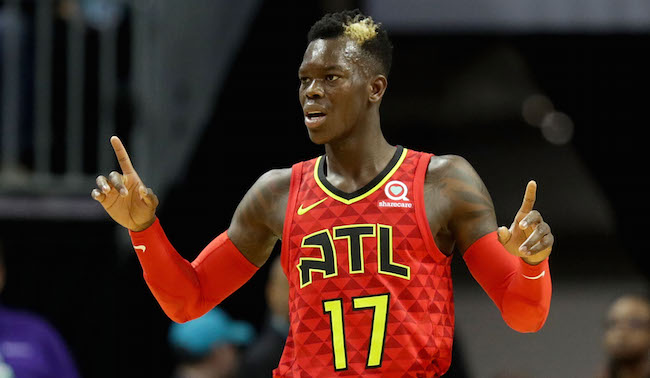
One of the final major moves of the 2018 NBA offseason saw the Thunder unload Carmelo Anthony’s $27.9 million contract on the Atlanta Hawks for Dennis Schröder in a three-team deal that, at its core, was a pair of teams looking to move on from disgruntled players on hefty contracts.
The reaction to the deal can basically be broken into two groups: those in Atlanta and those outside of it. For those in the latter group, this was a coup from the Thunder. They got rid of a significant chunk of their tax bill, did some addition by subtraction by removing the headache that was Melo’s insistence on starting and having a major role, and they added a starting caliber point guard into a reserve role in Schröder.
Those in Atlanta, along with those that paid close attention to the Hawks last year (which, outside of Atlanta, was very few for very good reason), saw this trade a bit differently. The Hawks, with massive amounts of cap space with which to take on a one-year deal like Anthony’s, managed to get a future first round pick (albeit lottery protected) and a cost-effective player in Justin Anderson they can re-sign as an RFA next season should they so choose, all while, most importantly, unloading Schröder’s $46.5 million remaining on his contract after a dismal season from the point guard in which he had all manner of off court issues as well.
It’s fascinating the disconnect between the two sides, and that leads me to believe this was probably a good trade for both considering fans on each side of the aisle feel like this was a win. That’s what trades are supposed to be, a mutually beneficial deal, and in this case you can easily make that argument. The Hawks will get massive amounts of flexibility moving forward in their rebuild and move on from Schröder and hand the keys to the franchise’s future at point guard to No. 5 overall pick Trae Young. The Thunder, who have two max stars locked up for the foreseeable future, don’t have any need for cap flexibility, and simply wanted to not pay hundreds of millions in tax dollars. So, they get tax relief and a useful backup point guard that is capable of fitting in with their team identity very well, provided he buys in.

That is the main question regarding Schröder and whether he will simply be who he has been in Atlanta, which would be of marginal help to OKC, or if he can take a step to being a critical role player for a squad with lofty postseason aspirations. With the Hawks last year, Schröder found himself going through the motions on a team that had no prospects of winning and no illusions of even trying to do so. His counting stats looked pretty good on paper, with 19.4 points and 6.2 assists per game, but that came with a sky-high usage rate of 30.4 and on some wildly inefficient shooting as his 51.5 true shooting percentage was the 12th best among regular rotation players on the Hawks.
Schröder has never been a good shooter. A career 32 percent three-point marksman, Schröder saw that percentage dip to a disastrous 29 percent in 2018-19, his worst since his rookie season. The upshot there is that with the Hawks he had to create a stunning amount of his own three-point looks — only 56.6 percent of his threes were assisted, compared to a previous low of 67 percent — and catch-and-shoot threes are by far the more efficient shot. In Oklahoma City, he should have more spot-up opportunities and the hope for the Thunder is that he can return to being a 33-34 percent shooter from distance.
Offensively, Schröder’s impact is not likely to be as important to the Thunder as what he can do defensively. Coming out of the draft in 2013, Schröder was known as “Baby Rondo,” a defensive pest with a similarly freakish wingspan, capable of frustrating opposing point guards on that end of the floor. However, as the Hawks removed themselves from contention, Dennis removed himself from caring about defense.
Last season, Atlanta was 4.2 points per 100 possessions better on defense with Schröder on the bench, and his defensive rating while on the floor was the worst of any rotation player not named Marco Belinelli. That’s pretty bad for someone whose greatest skill is on the defensive end of the floor. However, like with his shooting, there is reason to believe playing on a contender in Oklahoma City — a team whose identity last year was as a tough-nosed defensive squad — he will be reinvigorated on that end and put forth the effort needed to capitalize on his physical gifts.
The answer to the question “what kind of impact can Schröder have on the Thunder?” is entirely dependent on Schröder. He thinks very highly of himself, so getting him to accept the role of backup to Russell Westbrook will be a larger task for Billy Donovan than I think most would expect, given Westbrook is a year removed from being the league’s MVP. If Dennis buys in completely, to his role and to the team’s identity as a defense-first squad, and takes a step offensively, it could be a tremendous match and he may very well become a key rotation piece for the Thunder. However, as we’ve learned in recent years in Atlanta, those are all big ifs and fans in OKC and around the league should likely temper expectations for Year 1 of this new marriage.






